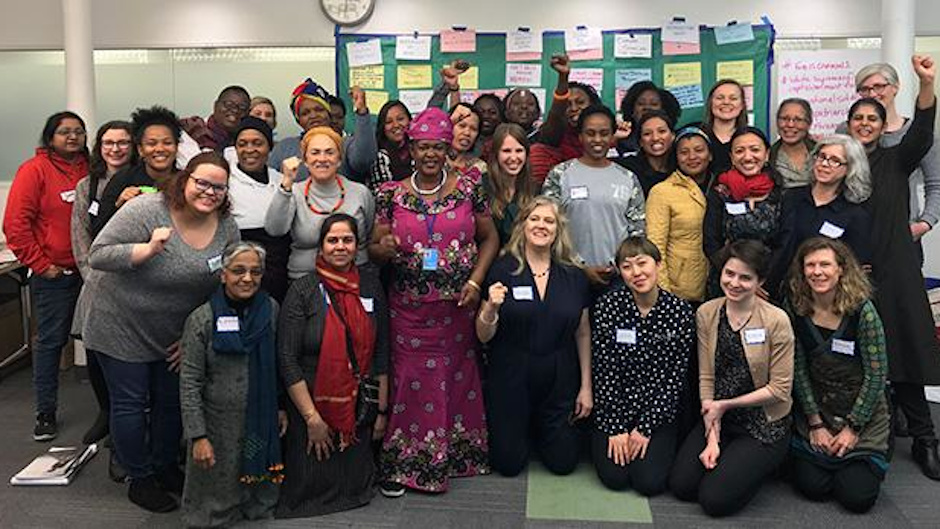Miami Law Human Rights Clinic students Maria C. Rodriguez, Danielle Befeler, and Riva Ryan spent their spring break in New York advocating for rural women by participating in the United Nations 62nd Commission on the Status of Women.
Arranged by Professor Caroline Bettinger-López and R. Denisse Córdova Montes, the Gender & Women’s Right Coordinator at Food First Information and Action Network International, the students attended United Nations events throughout the week. Topics covered were regarding women and the right to food in different contexts: reproductive rights, agribusiness, Ecuadorian rural women, Native American women, and the right to life.
Rodriguez was chosen to deliver two case studies on the industrialization of agriculture in Colombia. The second-year presented the cases of the Hidrosogamoso and Monte Oscuro communities on a panel discussion sponsored by the Gender Centre at the Graduate Institute for International and Development Studies in Geneva.
The Colombian native discussed transnational corporations and their violations against rural women’s right to food.
“As the only student on the panel, I was extremely nervous, but with the help of my peers at the clinic, Professor Bettinger-López, and FIAN, and having already participated in a week's worth of UN events, I felt prepared and determined,” she said.
“Listening to survivors and women from all over the world, who are directly affected by gender violence empowered me as a woman and a social justice advocate.”
Befeler and Rivas, both 3Ls, helped FIAN International’s Córdova put together the United Nations Closed Consultation on the Right to Food and Nutrition.
Along with New York City nonprofit Why Hunger, Befeler organized and came up with the methodology for the event, in accordance with the Food and Agriculture Organization of the United Nation’s Voluntary Guidelines to support the progressive realization to the right to adequate food in the context of national food security.
The event included women from the Rural Women’s Assembly, a coalition of rural woman in southern Africa; Panama’s Kuna Youth Movement; the World Forum of Fisher Peoples from Kenya; Why Hunger from New York City; National Rural Women’s Coalition from the Philippines; Malaysia’ Asia-Pacific Resource and Research Centre for Women; and SAHAYOO from India.
Through the efforts of FIAN, Why Hunger, and the UM Law Human Rights Clinic, the women discussed the successes and challenges on the right to food in their respective countries and mapped their issues on a board demonstrating the shortcomings of the Voluntary Guidelines, the UN measurement for the right to food. The information will all be compiled in a report from the notes taken by the three students to show the gaps of the Voluntary Guidelines when applied to real situations around the world where women are disproportionately affected on the right to food.
“My favorite part of the experience was when all the women came together at the end and chanted ‘Globalize the Hope. Globalize the Struggle' in our native languages. At one point, a group of women broke out into song, and there was a sense of real unity among us women working towards the same goal of ensuring access to food around the world,” said Befeler.
Befeler and Rodriguez were generously given passes to the UN event "Defending the Right to Life: Killing Women and LGBTIQ Persons during Conflict," a high-level panel co-sponsored by the government of Finland, the Office of the High Commissioner for Human Rights, and CUNY Law. The event included the Special Rapporteurs on extrajudicial, summary, or arbitrary executions and violence against women, who discussed the problems suffered by women and LGBTQI individuals in ISIS-occupied areas.
“I was so excited to be in the United Nations and hear the Special Rapporteurs talk about these genuine situations. It is inspiring to see the work going on at the international level, and it makes me want to be a part of it,” Befeler said.
“This would not have been possible if not for the tremendous help of Denisse Córdova and Professor Bettinger-López,” Ryan said.
More on The Human Rights Clinic
More on Human Rights Law at Miami Law

